Committed Cinema
ebook ∣ The Films of Jean-Pierre and Luc Dardenne; Essays and Interviews
By Bert Cardullo

Sign up to save your library
With an OverDrive account, you can save your favorite libraries for at-a-glance information about availability. Find out more about OverDrive accounts.
Find this title in Libby, the library reading app by OverDrive.



Search for a digital library with this title
Title found at these libraries:
| Library Name | Distance |
|---|---|
| Loading... |
Jean-Pierre Dardenne trained as an actor and his younger brother, Luc, studied philosophy; but they have dedicated themselves to filmmaking since the 1970s. After earning a reputation in their native Belgium for directing socially and politically conscious documentaries, they directed their first fiction feature, Falsch, in 1986. They have also been active as producers and in 1975 founded Dérives, a company with more than sixty documentaries to its credit. A second company, Les Films du Fleuve, was formed in 1994. The brothers hail from Wallonia, the southern, French-speaking region of Belgium that provides the gritty, postindustrial landscape so omnipresent in their films.In the decade since their third fiction feature, La Promesse (1996), became an international success, the unassuming but highly determined Dardennes have ascended to the forefront of a newly revived socially-conscious European cinema. At a time when filmmaking in Europe, however distinguished, seemed largely unmoored from the social changes wrought by the end of the Soviet empire, La Promesse offered a modest but profound view of illegal immigration and worker exploitation, anchored in the moral complexities of the relationship between a Belgian contractor and his teenaged son. Two prizes at Cannes for Rosetta (1999)—which conveys the obsessive extent to which a teenaged girl demands a job, a home, and a normal life—consecrated the Dardenne brothers as leading international cinéastes. Rosetta was followed by three similarly socially realistic films that are at the same time intimate character portraits: The Son (2002), L'Enfant (2005), and The Silence of Lorna (2008). In each of their five feature films since 1996, the Dardennes' rigorous, handheld camerawork and highly selective framing merge with physically intense acting to evoke a realistic tradition infused with philosophical and spiritual depth—one that hearkens back to both Rossellini's Germany Year Zero (1948) and Bresson's Pickpocket (1959). Committed Cinema: The Films of Jean-Pierre and Luc Dardenne is the first book in English to treat the work of the Dardennes, and features the best essays and interviews (supplemented by a chronology, a filmography, film credits, and a bibliography) published to date on the two brothers' memorable films.







